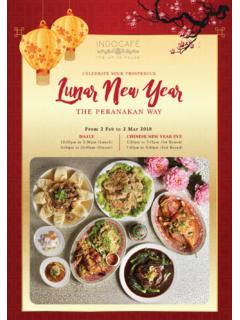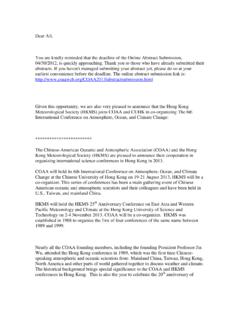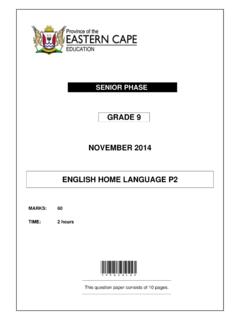Transcription of Hong Kong’s Popular Entertainment 1. Introduction
1 Hong Kong s Popular Entertainment 1. Introduction Popular Entertainment can be defined as forms of Entertainment that are accepted and enjoyed by most people in a society. Popular Entertainment is intimately connected with people s lives and forms part of their culture; its transformation reflects the changing times. Adhering to traditional customs and practice, the local chinese had various traditional forms of Entertainment , such as dragon dances, lion dances and outdoor chinese opera, all of which were performed to celebrate the birthdays of deities. After the cession of Hong Kong to the British government in 1842, new and foreign forms of Entertainment such as horseracing, football, movies and so on, reached its shores.
2 In the beginning, such activities were partaken by Europeans and some chinese , but they gradually became more widespread and eventually became part of the Popular Entertainment in Hong Kong. Hong Kong has seen many changes over the past 150 years population increase, economic development, technological advancement, the transformation of its society and the growth of its commerce. In tandem with these changes is the evolution of Hong Kong s Popular Entertainment , in terms of venues, programme content, games equipment, participation methods and so on. Several trends can be gleaned from observing these developments. Entertainment in Hong Kong is evolving from one that involves mass participation to one that engages the individual, and it is no longer something to be indulged in at one s leisure but a consumer activity with commercial interests.
3 In addition, tangible toys, which are played in real time and space, are being replaced by virtual games unfettered by physical constraints. The essay studies the development of Popular Entertainment in Hong Kong with focus on the following themes: Traditional Festival Celebrations, Street Entertainment , Horseracing, Football, Amusement Parks, Travel, Theatres, Radio Broadcasting, Television, Toys and Games, Comics, Karaoke and Online Entertainment . By reading the essay, it is hoped that some of your increasingly hazy memories of the not-so-distant past can be evoked. 12. The Development of Popular Entertainment in Hong Kong Before the British arrived in Hong Kong, the residents in local villages and hamlets had their own forms of Entertainment , some of which were local, while others were introduced from Guangdong.
4 Cantonese opera was one of the most Popular entertainments that was enjoyed by the locals. Whenever there were festivals and temple fairs. Cantonese opera and dragon and lion dances would be performed as thanksgiving to the deities and Entertainment for mortals. Apart from these performances, peripatetic entertainers would perform Cantonese opera songs and material arts displays on the streets. Gradually, a whole dai daat dei (flea market) culture evolved, where ordinary people would seek Entertainment in their spare time. After Hong Kong was ceded to Britain in 1842, the British brought in their forms of Entertainment such as horseracing and sports like football, some of which became Popular in the colony. The racecourse in Wong Nai Chung was completed in 1846, which provided a horseracing venue for Europeans and some chinese .
5 It also provided the general public with a sizeable location for leisure and Entertainment . Similarly, football was at first an exclusive European sport after it was introduced into Hong Kong. However, after the chinese began to form football teams and audience numbers grew as a result, the game became a Popular pastime among locals. With urbanization, urban Entertainment like movies and radio programmes gradually became more Popular among the people of Hong Kong. Amusement parks of all sizes also opened, complete with eateries and mechanized games, which provided locals with new forms of Entertainment and became public spaces for urban leisure and Entertainment . The population of Hong Kong had reached almost 350,000 by 1931, with Central, Sheung Wan, Wan Chai and Yau Ma Tei being the most densely populated areas.
6 Due to the inadequate transport links in those days, most people in Hong Kong conducted their daily lives and leisure activities within the urban areas; only a handful went hiking or sightseeing in the countryside. During the Japanese Occupation between 1941 and 1945, large numbers of people left Hong Kong for the mainland. Although radio broadcasts and horseracing events were sustained throughout the occupation and the cinemas continued to screen movies, the unrest and lawlessness of the society meant that people turned to gambling instead. 2 Popular Entertainment in Hong Kong before the Second World War was already indicative of the unique East-meets-West feature of Hong Kong society. This is a place where traditional village entertainments existed side by side with western horseracing and football; a city where people were entertained in movie houses, amusement parks, even on pavements and street corners.
7 After the end of the Second World War, massive numbers of immigrants entered Hong Kong from the mainland. By the mid-1950s Hong Kong s population had grown to more than two million, most of which were concentrated in the city area. A dense urban population provided the foundation a market for the growth of Popular Entertainment . In the 1960s a new worker class emerged with Hong Kong s industrialization, whose members pursued different forms of Entertainment in their spare time. Leisure activities such as watching street performances in dai daat dei, movies, football, horseracing, hiking and even gambling developed and found more adherents. According to the 1961 census, percent of the population in Hong Kong were below 15 years old, reflecting the high birth rates in the immediate post-war years.
8 The increase in the children s population supposedly brought the proliferation of comic books and toys. That being said, Hong Kong in the 1950s and 1960s was not an affluent city. Most children could only hire comic books from pavement book stalls, and toys were frequently shared with other children in the neighborhood. The ongoing economic development in Hong Kong meant that the number of small factories kept increasing. For the worker class, radio programmes became the major form of Entertainment at the work place. To retain their staff, factory owners would organize party tours which gave rise to more local hiking and sightseeing activities. The living conditions of the general public improved in the 1970s. Television sets became essential household items and television programmes provided free Entertainment for the hardworking people of Hong Kong.
9 Television also brought outdoor competitions and sports like football and horseracing into living rooms. From then on, watching television became the most Popular form of Entertainment . In recent decades, the market has been saturated with many new electronic products and audio-visual equipment. Walkmans, hand-held electronic games, video 3cameras and karaoke have revolutionized leisure and Entertainment . The popularization of personal computers and the Internet give rise to a new platform for enjoying multimedia Entertainment programmes. One can play chess, read, place bets on the computer; television shows, movies and radio programmes can also be accessed via the Internet. Technological and economic advances meant that Entertainment is no longer constrained by time and space.
10 Entertainment is becoming individualized and virtualized. At the same time, with the increase in commercialization, hitherto simple leisure activities have now become consumer and commercial pursuits. 43. Traditional Festival Celebrations The chinese make up the majority of Hong Kong s population. The Entertainment they enjoyed was closely linked to traditional festivals. In the past, whenever there were important feast days, the local chinese would set off firecrackers and put up lion and dragon dances. Families would also gather for sumptuous dinners. During the Lunar New Year, friends and relatives visited one another and in the evening of Lantern Festival. They would go out to see the lantern displays.







